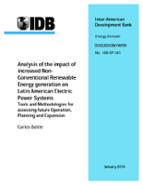Analysis of the impact of increased Non-Conventional Renewable Energy generation on Latin American Electric Power Systems
Date issued
Jan 2014
Subject
Electricity;
Electric Transmission Line;
Non-Conventional Renewable Energy;
Energy Generation;
Renewable Energy;
Energy;
Investment;
Wind Power;
Hydropower
Country
Bolivia;
Chile;
Uruguay;
United States;
Argentina;
Paraguay;
Brazil;
Peru;
Ecuador;
Venezuela;
Nicaragua;
Costa Rica;
Guatemala;
Mexico;
Colombia
Category
Discussion Papers
The new renewable sources, such as sun or wind, show a specific set of characteristics such as geographical and temporal variability that challenge their integration into traditional energy systems to supply electricity. These aspects have a great impact in the operation of electricity systems that go from the need for generation reserve in the system in order to guarantee operational reliability to possible changes in network and electricity infrastructure planning. The report is structured as follows: Section 1 provides an overview of renewables in Latin America; Section 2 includes a conceptual analysis of how the penetration of NCREs impacts power systems; ection 3 provides a brief description of some solutions being or which could be applied to optimize the penetration of NCREs while maximizing it; Section 4 discusses some basic conceptual aspects that should be considered when
dealing with the problem of long-term power system planning; Section 5 provides a general review of the main computer approaches being applied
or studied in order to support decision-making for expanding electricity systems, for both the generation and the network side (transmission and distribution); Section 6 analyzes a series of experiences from a selection of Latin American countries. The aim is to briefly describe how each country is conducting its planning processes, focusing on the computer tools being used; Finally, Section 7 provides conclusions and improvement recommendations.
dealing with the problem of long-term power system planning; Section 5 provides a general review of the main computer approaches being applied
or studied in order to support decision-making for expanding electricity systems, for both the generation and the network side (transmission and distribution); Section 6 analyzes a series of experiences from a selection of Latin American countries. The aim is to briefly describe how each country is conducting its planning processes, focusing on the computer tools being used; Finally, Section 7 provides conclusions and improvement recommendations.



